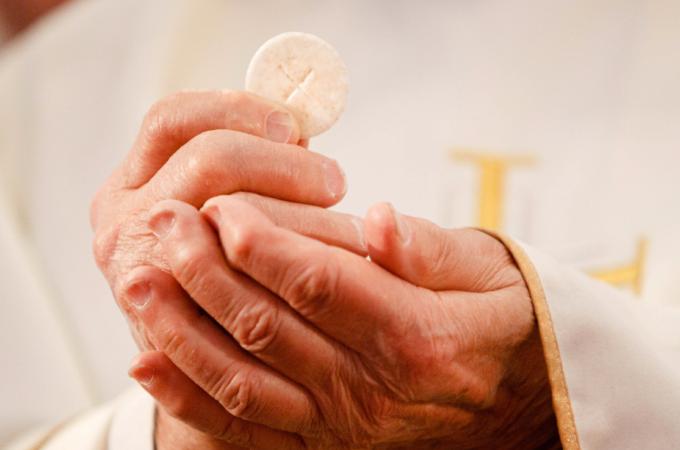Controversy and Communion
''Divided U.S. Catholic Bishops Will Debate Communion Policy."
"Targeting Biden, Catholic Bishops Advance Controversial Communion Plan."
"Catholic Democrats Urge Bishops against 'Weaponization' of Communion."
When the Church makes the headlines, it's usually not a good thing. Still, none of us should be shocked whenever the tension between the Church and civil authority erupts. The struggle between the here and the hereafter is a very long saga, and history is filled with all its associated drama.
But before we rush to write letters or take sides, we ought to recognize that the real battle isn't the false narrative we see so zealously framed by the media. The real battle is the one fought in every heart sincerely trying to hear the Good Shepherd's voice amid the fray. The challenge for us is as it has ever been: answering Christ's call to be "in the world but not of it."
Jesus didn't sugarcoat his Gospel or pull any punches with his disciples. He warned them -- and us -- that his followers would be persecuted; that things would not go any better for us in this world than they had for him. But he also told us to take courage, because he had "conquered the world." (See John 16:33.) Ultimately, that's what this life is all about: overcoming the world we build around ourselves with the kingdom God is building within and among us.
Of course, overcoming the world isn't a given for any of us. It's what's at stake in how every human life is lived. The choices we make matter because possessing the truth isn't the same as living according to it. Choosing who we listen to and who we follow is part of that equation.
Lately, I've been reading Exodus 32 and thinking about the newly free children of Israel at the foot of Mount Sinai. All the people God had brought out of slavery and through the Red Sea, all those who had seen God's miracles and experienced his salvation, were suddenly worshipping a Golden Calf. Even Moses' brother, Aaron, was an active participant in this affront; he melted down the gold they took out of Egypt to make the idol and built an altar in front of it. All this while Moses was receiving God's law from God himself.
The solution to this crisis in faith and leadership wasn't an easy one. Moses stood at the gate of the camp and called every Israelite to make a choice, saying: "Whoever is for the Lord, come to me." The Levites who repented were then commissioned to slay the remaining idolaters. Sadly, the Scriptures record that three thousand people fell that day.
We all have the freedom to choose what we will worship, who we will listen to, and who we will ultimately follow. Like every choice we make, there are consequences. However the current battle plays out, there will be suffering and loss. There will also be power politics and misrepresentation.
There are a few things we all can do. We can leave the governance of the Church to those who are actually entrusted with governing the Church. We can decide to wait for our bishops to come down from the mountain and commit to praying for them all while they seek God's counsel. In the meantime, we can refuse to make an idol of politics within the Church or outside her. We can stop listening to the narrative as it is framed by the media. We can resist pitting the bishops we agree with against those we don't like. We can receive the Eucharist with gratitude, and as an expression of the communion that only the eucharistic Lord can create and preserve. And we can encourage each other to choose a path of honesty and integrity when it comes to living the truths we say we believe, by acknowledging when we don't.
- Jaymie Stuart Wolfe is a Catholic convert, wife, and mother of eight. Inspired by the spirituality of St. Francis de Sales, she is an author, speaker, and musician, and provides freelance editorial services to numerous publishers and authors as the principal of One More Basket. Find Jaymie on Facebook or follow her on Twitter @YouFeedThem.



















